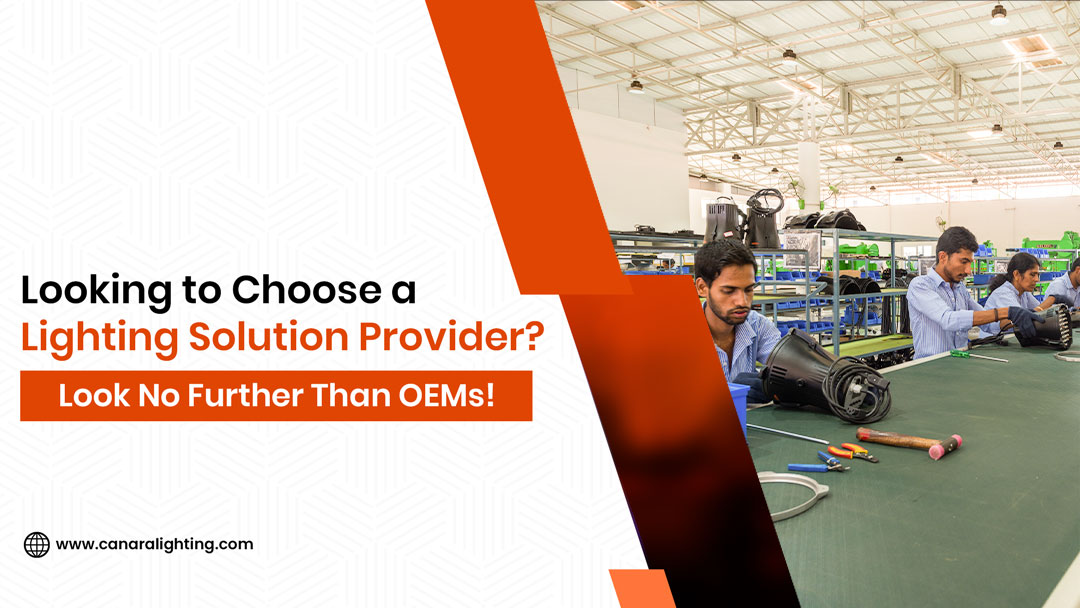
This is why when you have customized lighting requirements on a relatively larger scale, the best course of action is to contact an OEM – Original Equipment Manufacturer. From auditoriums to stadiums to film and TV sets, big productions call for large-scale lighting fixtures, rigs, cables, panels, etc., and only OEMs are equipped to meet your requirements.
Not quite convinced and leaning towards cutting a deal with a small-time trader who promised extra discounts? Allow us to throw some light on why that may not be the best idea, and why OEMs are the way to go:
- Customization to a T
Whether you run a TV or a film studio, you’re designing a building, or you have a sports stadium, your lighting requirements will keep changing depending on your vertical. Traders and middlemen who simply procure lighting equipment may fall short of your needs, especially if you need specialized solutions. Signing a lighting contract with an OEM will ensure all your lighting fixture needs are met in terms of scale, location, effects, product selection, and in a myriad of other ways. - Dynamic Strategies & Support
Execution doesn’t always go according to plan, not even for the best laid out ones. And for big projects like auditoriums or film studios, it is especially likely that tweaks in the strategy will come up along the way including some spontaneous improvisations. Original equipment manufacturing companies often possess dynamic strategies that can be assessed and updated with progress. They also have the know-how and the capability to change plans on the go and figure out the best way forward for your lighting project. - Quality Assurance & Safety
Whether it’s your diminutive ceiling LED breaking down, or a huge, stadium floodlight hovering 50 feet above your head, you want to make sure that the action doesn’t stop because of a damaged. Reputed OEMs come with the assurance of multiple, international standards like ISO 9001 & 14001 certification, CE certification, and the BIS certification for lighting fixtures. Most OEMs also have the advantage of in-house testing facilities, as well as photometry labs to ensure the quality parameters like Color Rendering Index (CRI), Television Lighting Consistency Index, R9 factor, etc., are up to the mark. - Keeping Up with Latest Trends
The lighting industry has seen a drastic shift over the last decade. LEDs and digital controllers have disrupted long-held technological assumptions and lit up the market with their intuitive shapes, shades, and ease of integration. The smart lighting revolution has led LED lighting manufacturers to innovate in leaps and bounds in the last decade, with luminous surfaces, interactive smart lights, biophilic designs, and a whole lot more! For custom lighting manufacturers, it has become imperative to keep up with the latest trends which is why signing a lighting contract with an OEM is the smart way forward. - Industry Experience & Responsibility
With experience comes wisdom. And it is no different for OEMs, who with their nuanced knowledge on the subject are able to cater to their clients in a much more personalized and quality-oriented manner. Clients can expect a hands-on approach ensuring there are no compromises on quality as well as safety. Another positive of OEMs and their all-inclusive services is that they hold themselves accountable to the highest of standards, and are bound to keep up their reputation by standing by their products and services.
If all these reasons weren’t enough for you to sign a lighting contract with an OEM, we’ve got a few more features that often get overshadowed. Let’s take a quick look:
- All-Inclusive Services
OEMs are often comprehensive solution providers. From technical proposals to design, manufacture, installation, and training, all the way to after-sales services, they do it all. - Value for Money
Opportunists and small-time traders are often in it for the money, neglecting the quality aspect. OEMs are legitimate value providers and prioritize impeccable service over the bottom line. - Supreme Versatility
Despite the lighting industry being so vast, ranging from architectural lights, music festivals, and water fountains, to film and TV studios, OEMs possess the ability to cater to multiple industries because of their all-inclusive services.
